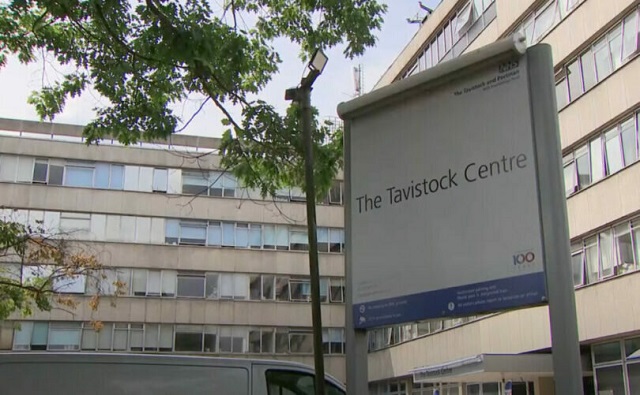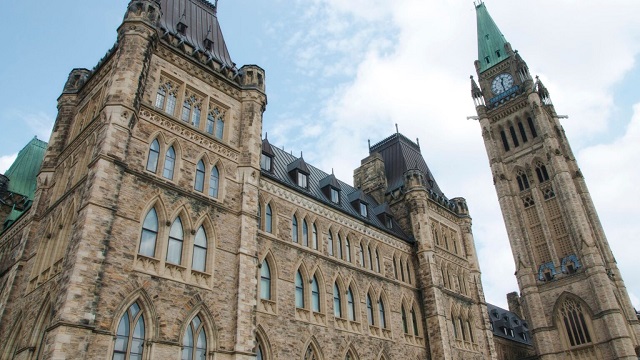Health
UK’s National Health Service to stop prescribing puberty blockers to gender-confused children

The UK’s Tavistock center
From LifeSiteNews
In January, it was revealed that the facility had seen almost 400 children younger than six years old and more than 70 aged four or younger over the past decade.
The British National Health Service (NHS) is formally ending the prescribing of puberty blockers to children with gender confusion, in a major policy shift representing a victory against transgender ideology.
The i Paper reports that the change follows the recommendation of a multi-year independent review led by consultant pediatrician Dr. Hilary Cass. The underage use of puberty blockers will now be limited to clinical research trials. The change does not apply to Scotland, whose government says blockers will only be considered for minors “after close psychological and endocrine assessment,” per the report.
“We have always been clear that children’s safety and wellbeing is paramount, so we welcome this landmark decision by the NHS,” said Health Minister Maria Caufield. “Ending the routine prescription of puberty blockers will help ensure that care is based on evidence, expert clinical opinion and is in the best interests of the child.”
Reconsideration of NHS’s standards for chemically “transitioning” young people was bolstered by years of concern over the lax standards at the scandal-ridden Gender Identity Development Service (GIDS), operated by the Tavistock and Portman NHS Foundation Trust. In January, it was revealed that the facility had seen almost 400 children younger than six years old and more than 70 aged four or younger over the past decade.
The GIDS had long been a source of controversy, from its backing of a discredited study used to justify giving puberty blockers to 11-year-olds, to a case last August in which it approved a “sex-change” procedure for a 22-year-old suffering from over a dozen mental health disorders.
Cass’s report found that the GIDS had failed to consistently collect follow-up data on the long-term outcomes for children who received puberty blockers, “which means it is not possible to accurately track the outcomes and pathways that children and young people take through the service.”
Puberty blockers, which are used to chemically castrate sex offenders, have been shown to devastate bone density in children, putting them at risk of osteoporosis, fractures, and other injuries. Other side effects associated with the drugs including emotional disorders, pseudotumor cerebri, paralysis, renal impairment, sudden cardiac death, and stroke in men, as LifeSiteNews has reported.
The Tavistock clinic is closing at the end of the month, and on Cass’s recommendation, NHS will be opening a pair of regional clinics in April, which it says will employ a more “holistic approach to care,” including neurodiversity, pediatrics, and mental health.
A significant body of evidence shows that “affirming” gender confusion carries serious harms, especially when done with impressionable children who lack the mental development, emotional maturity, and life experience to consider the long-term ramifications of the decisions being pushed on them, or full knowledge about the long-term effects of life-altering, physically transformative, and often irreversible surgical and chemical procedures.
Studies find that more than 80% of children experiencing gender dysphoria outgrow it on their own by late adolescence, and that even full “reassignment” surgery often fails to resolve gender-confused individuals’ heightened tendency to engage in self-harm and suicide — and may even exacerbate it, including by reinforcing their confusion and neglecting the actual root causes of their mental strife.
Some physicians heavily involved in transitioning minors have been caught on video admitting to more old-fashioned motives for such procedures, as with an exposé last year about Vanderbilt University Medical Center’s Clinic for Transgender Health in the United States, where Dr. Shayne Sebold Taylor said outright that “these surgeries make a lot of money.”
Addictions
Why can’t we just say no?

From the Frontier Centre for Public Policy
Drug use and violence have become common place in hospitals. Drug-addicted patients openly smoke meth and fentanyl, and inject heroin. Dealers traffic illicit drugs. Nurses are harassed, forced to work amidst the toxic fumes from drugs and can’t confiscate weapons. In short, according to one nurse, “We’ve absolutely lost control.”
“Defining deviancy down” is a cultural philosophy that emerged in the United States during the 1990s.
It refers to society’s tendency to adjust its standards of deviancy “down,” so that behaviours which were once unacceptable become acceptable. Over time, this newly- acceptable behaviour can even become society’s norm.
Of course, the converse must also be true — society looks down on those who label social behaviours “wrong,” deeming them moralistic, judgemental or simply out of touch with the realities of modern life.
Thirty years later, this philosophy is entrenched in British Columbia politics and policies. The province has become a society that cannot say “no” to harmful or wrong behaviours related to drug use. It doesn’t matter if you view drug use as a medical issue, a law-and-order issue, or both – we have lost the ability to simply say “no” to harmful or wrong behaviour.
That much has become abundantly clear over the past two weeks as evidence mounts that BC’s experiment with decriminalization and safe supply of hard drugs is only making things worse.
A recently-leaked memo from BC’s Northern Health Authority shows the deleterious impact these measures have had on BC’s hospitals.
The memo instructs staff at the region’s hospitals to tolerate and not intervene with illegal drug use by patients. Apparently, staff should not be taking away any drugs or personal items like a knife or other weapons under four inches long. Staff cannot restrict visitors even if they are openly bringing illicit drugs into the hospital and conducting their drug transactions in the hallways.
The public was quite rightly outraged at the news and BC’s Health Minister Adrian Dix quickly attempted to contain the mess by saying that the memo was outdated and poorly worded.
But his facile excuses were quickly exposed by publication of the very clearly worded memo and by nurses from across the province who came forward to tell their stories of what is really happening in our hospitals.
The President of the BC Nurses Union, Adriane Gear, said the issue was “widespread” and “of significant magnitude.” She commented that the problems in hospitals spiked once the province decriminalized drugs. In a telling quote, she said, “Before there would be behaviours that just wouldn’t be tolerated, whereas now, because of decriminalization, it is being tolerated.”
Other nurses said the problem wasn’t limited to the Northern Health Authority. They came forward (both anonymously and openly) to say that drug use and violence have become common place in hospitals. Drug-addicted patients openly smoke meth and fentanyl, and inject heroin. Dealers traffic illicit drugs. Nurses are harassed, forced to work amidst the toxic fumes from drugs and can’t confiscate weapons. In short, according to one nurse, “We’ve absolutely lost control.”
People think that drug policies have no impact on those outside of drug circles – but what about those who have to share a room with a drug-smoking patient?
No wonder healthcare workers are demoralized and leaving in droves. Maybe it isn’t just related to the chaos of Covid.
The shibboleth of decriminalization faced further damage when Fiona Wilson, the deputy chief of Vancouver’s Police Department, testified before a federal Parliamentary committee to say that the policy has been a failure. There have been more negative impacts than positive, and no decreases in overdose deaths or the overdose rate. (If such data emerged from any other healthcare experiment, it would immediately be shut down).
Wison also confirmed that safe supply drugs are being re-directed to illegal markets and now account for 50% of safe supply drugs that are seized. Her words echoed those of BC’s nurses when she told the committee that the police, “have absolutely no authority to address the problem of drug use.”
Once Premier David Eby and Health Minister Adrian Dix stopped denying that drug use was occurring in hospitals, they continued their laissez-faire approach to illegal drugs with a plan to create “safe consumption sites” at hospitals. When that lacked public appeal, Mr. Dix said the province would establish a task force to study the issue.
What exactly needs to be studied?
The NDP government appears to be uninformed, at best, and dishonest, at worst. It has backed itself into a corner and is now taking frantic and even ludicrous steps to legitimize its experimental policy of decriminalization. The realities that show it is not working and is creating harm towards others and toward institutions that should be a haven for healing.
How quickly we have become a society that lacks the moral will – and the moral credibility – to just to say “no.”
Susan Martinuk is a Senior Fellow with the Frontier Centre for Public Policy and author of Patients at Risk: Exposing Canada’s Health-care Crisis.
Addictions
British Columbia should allow addicts to possess even more drugs, federal report suggests

From LifeSiteNews
Despite the drug crisis only getting worse in British Columbia after decriminalization, a federal report by the Canadian Institutes of Health Research advocates for further relaxing its policy so addicts can possess even more drugs.
Despite the drug crisis only worsening since decriminalization, federal researchers are now advocating for British Columbia to allow the possession of even larger quantities of cocaine, claiming that current possession limits don’t allow addicts to buy enough.
According to a federal report published April 23 by Blacklock’s Reporter, the current decriminalization program in British Columbia approved by Prime Minister Justin Trudeau’s government has set cocaine possession limits “too low.”
“People who use drugs are less concerned about being arrested and feel more comfortable carrying substances they need,” said the report by the Canadian Institutes of Health Research. “The threshold of 2.5 grams is too low and is unreflective of users’ substance use and purchasing patterns.”
Under the policy, which launched in early 2023, the federal government began allowing people within the province to possess up to 2.5 grams of hard drugs – including cocaine, opioids, ecstasy and methamphetamine – without criminal penalty, but selling drugs remained a crime.
The policy has been widely criticized, especially after it was found that the province broke three different drug-related overdose records in the first month the new law was in effect.
However, now researchers are claiming that the new policy is insufficient for drug users.
“People who use drugs indicated the 2.5 gram threshold is too low and unreflective of their substance use patterns,” the report stated. “Although some people indicated the policy wouldn’t impact their purchasing patterns because they are unable to purchase large amounts at a time, others suggested it may force them to seek out substances more frequently which could increase their risk of harms.”
“Buying in bulk may be more economical particularly for people who use drugs,” it continued, adding that it was “common practice to purchase in bulk and split or share among peers.”
The recommendation comes as deaths from drug overdoses in Canada have gone through the roof in recent years, particularly in British Columbia.
The effects of decriminalizing hard drugs in various parts of Canada has been exposed in Aaron Gunn’s recent documentary, Canada is Dying, and in U.K. Telegraph journalist Steven Edginton’s mini-documentary, Canada’s Woke Nightmare: A Warning to the West.
Gunn says he documents the “general societal chaos and explosion of drug use in every major Canadian city.”
“Overdose deaths are up 1,000 percent in the last 10 years,” he said in his film, adding that “[e]very day in Vancouver four people are randomly attacked.”
Similarly, even Liberals have begun to condemn Trudeau’s “safe supply” program, linking them to “chaos” in cities.
“Safe supply“ is the term used to refer to government-prescribed drugs that are given to addicts under the assumption that a more controlled batch of narcotics reduces the risk of overdose – critics of the policy argue that giving addicts drugs only enables their behavior, puts the public at risk, disincentivizes recovery from addiction and has not reduced, and sometimes even increased, overdose deaths where implemented.
Last week, Liberal MP Dr. Marcus Powlowski revealed that violence from drug users has become a problem in Ottawa, especially in areas near so-called “safe supply” drug sites which operate within blocks of Parliament Hill.
“A few months ago I was downtown in a bar here in Ottawa, not that I do that very often, but a couple of colleagues I met up with, one was assaulted as he was going to the bar, another one was threatened,” said Powlowski.
“Within a month of that I was returning down Wellington Street from downtown, the Rideau Centre, and my son who is 15 was coming after me,” he continued. “It was nighttime and there was someone out in the middle of the street, yelling and screaming, accosting cars.”
-

 COVID-1917 hours ago
COVID-1917 hours agoJapanese study finds ‘significant increases’ in cancer deaths after third mRNA COVID doses
-

 Business15 hours ago
Business15 hours agoMaxime Bernier warns Canadians of Trudeau’s plan to implement WEF global tax regime
-

 Brownstone Institute13 hours ago
Brownstone Institute13 hours agoA Coup Without Firing a Shot
-

 COVID-1911 hours ago
COVID-1911 hours agoWHO Official Admits the Truth About Passports
-

 Energy9 hours ago
Energy9 hours agoAnti-LNG activists have decided that they now actually care for LNG investors after years of calling to divest
-

 Bruce Dowbiggin14 hours ago
Bruce Dowbiggin14 hours agoCoyotes Ugly: The Sad Obsession Of Gary Bettman
-

 Freedom Convoy12 hours ago
Freedom Convoy12 hours agoOttawa spent “excessive” $2.2 million fighting Emergencies Act challenge
-

 Frontier Centre for Public Policy16 hours ago
Frontier Centre for Public Policy16 hours agoThe tale of two teachers



